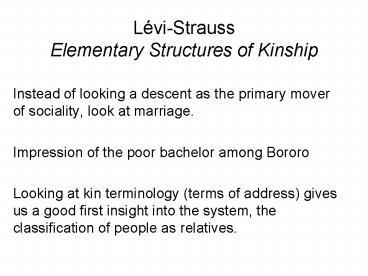LviStrauss Elementary Structures of Kinship - PowerPoint PPT Presentation
1 / 21
Title:
LviStrauss Elementary Structures of Kinship
Description:
Looking at kin terminology (terms of address) gives us a good first insight into ... Crow kinship terms. Cultural systems and social systems ... – PowerPoint PPT presentation
Number of Views:192
Avg rating:3.0/5.0
Title: LviStrauss Elementary Structures of Kinship
1
Lévi-Strauss Elementary Structures of Kinship
- Instead of looking a descent as the primary mover
of sociality, look at marriage. - Impression of the poor bachelor among Bororo
- Looking at kin terminology (terms of address)
gives us a good first insight into the system,
the classification of people as relatives.
2
English kin terms
Brian Schwimmer
3
Hawaiian Kin Terms
Brian Schwimmer
4
Iroquoian Kin Term System
Brian Schwimmer
5
Omaha kinship terms
6
Crow kinship terms
7
Cultural systems and social systems
- Schneider analyses American kinship as a cultural
system - Approach shared by Clifford Geertz
- Geertzs definition of culture
- "an historically transmitted pattern of meanings
embodied in symbols, a system of inherited
conceptions expressed in symbolic forms by means
of which men communicate, perpetuate, and develop
their knowledge about and attitudes toward life."
8
Models of and models for
- Models of -
- Theory of aerodynamics is a model of how birds
and airplanes fly. - This course provides models of rituals, social
systems, languages - Relatives (Kinship systems)
- Model for -
- Blueprints for a Boeing 747
- How is act like a good person
- How to find a spouse (Kinship systems)
9
Cultural systems organize chaos
- analysis of the system of meanings embodied in
the symbols which make up the kinship system - relating of the system to social-structural and
psychological processes
10
Two views of Yapese society
- Follows the assumptions that it is a kin-based
society, operating in an idiom of kinship - Does not make any of those assumptions, looks for
symbols of sociality and the meaning of those
symbols from the natives point of view.
11
Blood is thicker than water
Fundamental, implicit assumption in kinship
studies. Because blood is thicker than water
kinship consists in bonds on which kinsmen can
depend, are unquestionable, more compelling than
other kinds of relationships. States of being,
not doing Even Lévi-Strauss writes of the
natural links of kinship
12
Kinship as an idiom
- Depends on the idea, our assumptions of kinship
- Simple societies can be distinguished from
complex societies - Kinship, economics, politics, religion - all
universal - Reproduction of human beings. - biology (blood
ties)
13
Doctrine of the Genealogical Unity of Humanity
Biological kinship is usually distinguished
sharply from social kinship Social kinship was
about social facts (following Durkheim), but
biology was relegated to the background, an
assumption. Durkheim, Rivers, Radcliffe-Brown,
Malinowski made biological kinship either an
implicit or explicitly assumption.
14
So what?
Kinship is about human reproduction, previous
generations are replaced by new ones. A European
preoccupation - blood is thicker than water This
is not necessarily true for all people.
15
Kinship does not really exist
A Critique of the Study of Kinship,
1984 Schneiders critique it is an artifact of
the anthropologists and their culture more than
it is of the subject cultures they study By 1980
interest had already fallen off. In 1990s most
anthropologists agree that Schneider had a point,
but was a little over the top.
16
Now what?
Anthropology is the study of particular cultures.
The first task of anthropology is to understand
and formulate the symbols and meanings and their
configuration that a particular culture consists
of.
17
The problem
First we assume that kinship, economics,
politics, and religion are distinct things. Then
we describe a culture in terms of one these
categories, then in terms of another. All of
these institutions are inextricably interrelated
so that in any particular case they cannot be
clearly distinguished. Society cannot be
decomposed into constituent parts.
18
The solution
Take kinship as an empirical question. Value
and meaning in the total cultural configuration
must be added to the investigation and analysis.
19
Kinship is again a key problem
Not the reigning concept anymore (identity,
power, body, gender, colonialism) Returned as
the debate about the character of social
structure and central to understanding embodied
persons. Schneider remains key symbols, natives
point of view, belonging
20
Society no longer partible
Kinship, economy, religion, political
organization, etc. are not constituent parts of
a society or a culture Kinship is a system
not readily demarcated from economic, religious,
and governmental domains. Kinship is certainly
not something relegated to Others. Kinship of
Europe, North America, China, etc.
21
New Kinship
- Abandon biological thinking (descent) and examine
RELATEDNESS DIFFERENTIATION - How do a given bunch of people connect and
differentiate themselves to and from one another - This attention to differentiation foregrounds the
analytical category of GENDER.

